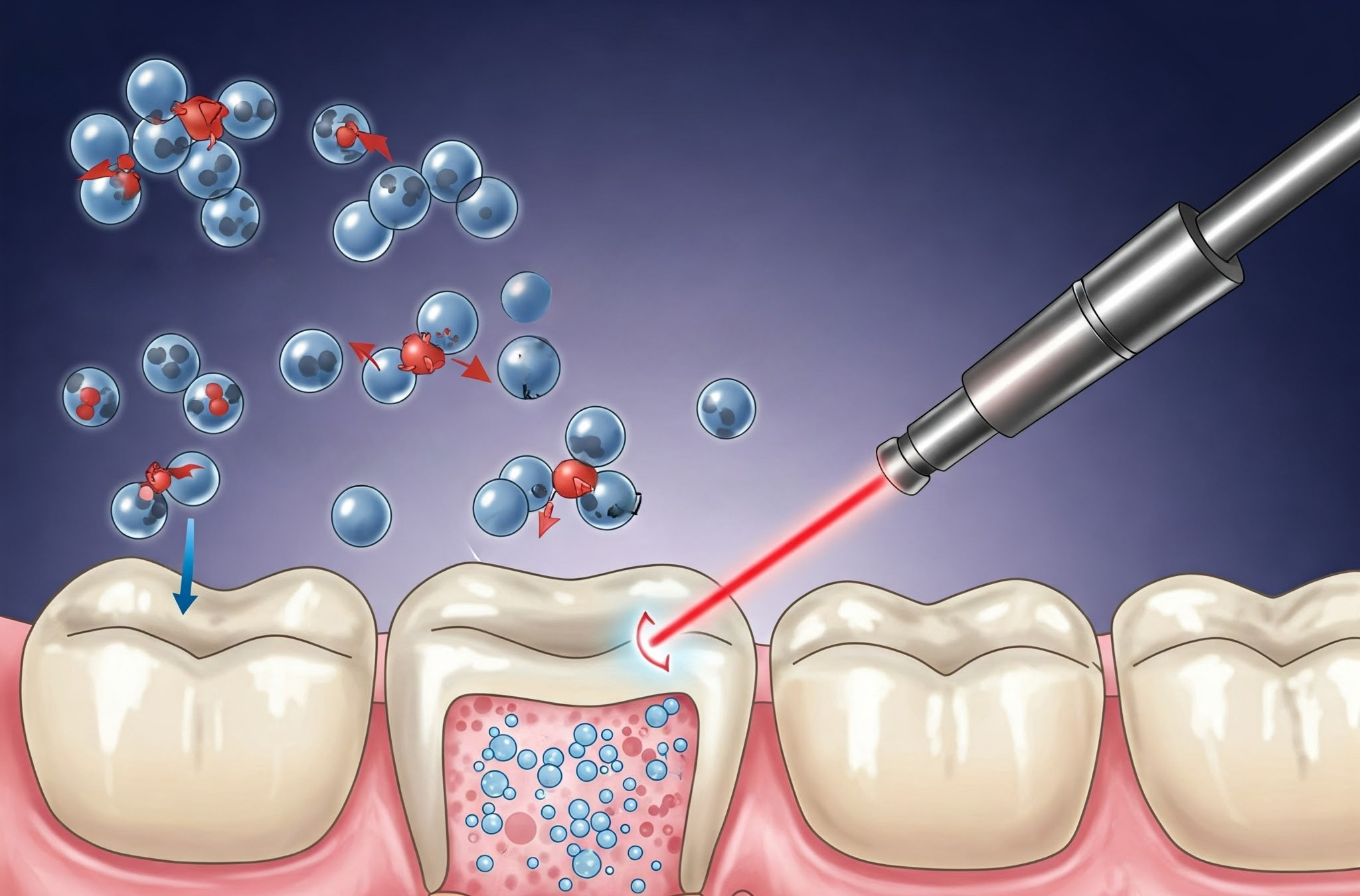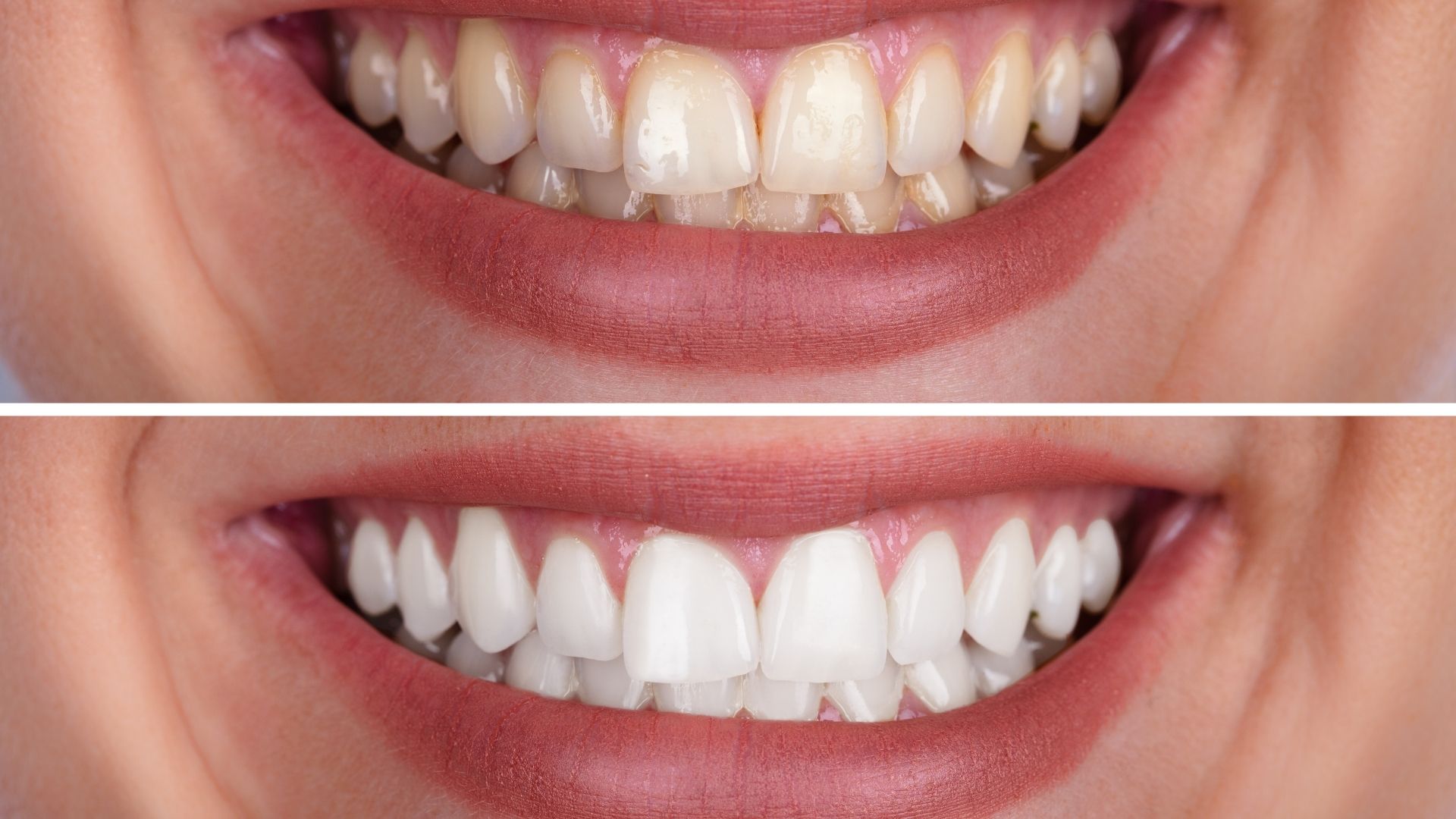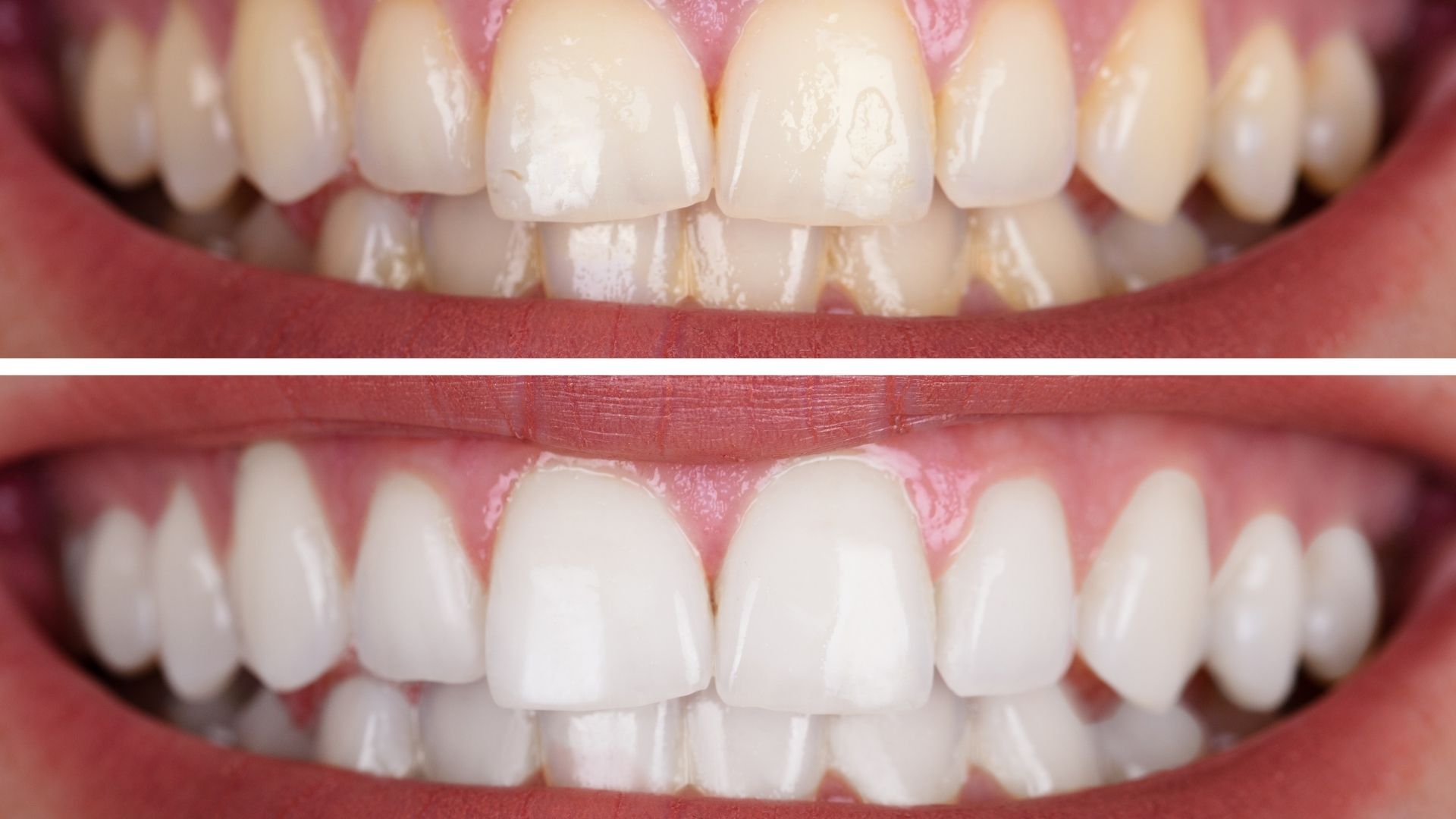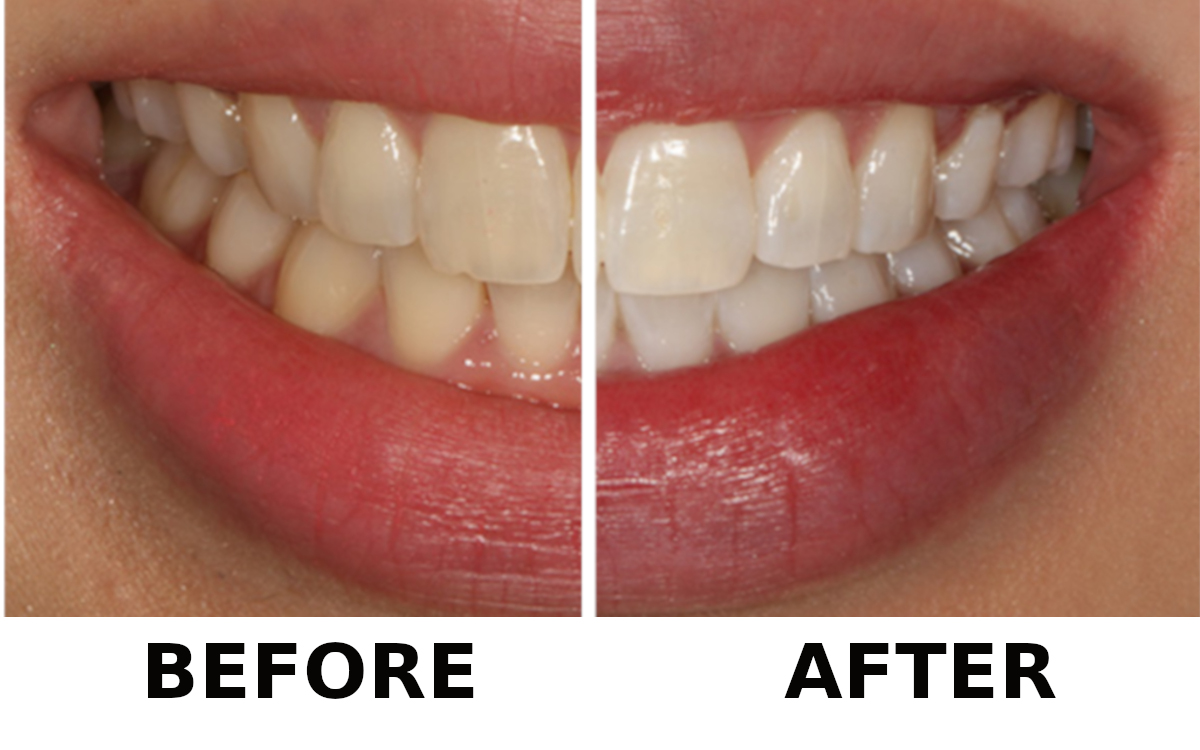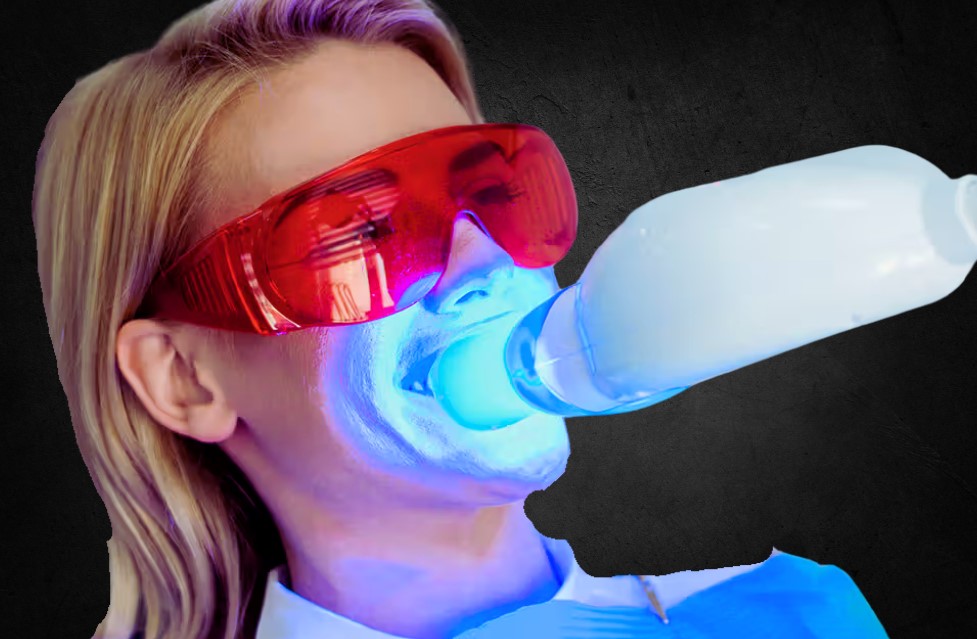Laser Teeth Whitening Before and After - Zoom Teeth Whitening in Turkey, Istanbul
Dreaming of a radiant smile? In-office laser teeth bleaching offers a swift transformation, banishing stains and unveiling a brighter you. Laser teeth whitening cosmetic dental treatment utilises a potent peroxide-based gel, energised by focused lasers, to lift discolourations. This method delivers noticeable improvements in a single visit, often brightening teeth multiple shades. Furthermore, its design ensures comfort, reducing discomfort for the majority of patients.
Laser teeth whitening is a dental procedure designed to reduce tooth discolouration. It involves the procedure of a bleaching gel, typically containing hydrogen peroxide, which is then activated by a laser or high-intensity light source.
The process begins with dental cleaning and the application of a protective barrier to the gums. The bleaching gel is applied to the teeth, and the light source is used to activate the gel. This sequence is repeated within a single appointment, usually for an hour.
Important factors to consider about laser teeth whitening
- The cost of laser whitening is typically higher than at-home whitening methods.
- The duration of whitening effects is influenced by individual factors and oral hygiene.
- This procedure may not be suitable for all individuals.
- Individual results will vary.
Consultation with a dental professional is recommended to determine suitability for this procedure.
How does laser teeth whitening work?
In-office laser teeth whitening utilizing laser energy is a technique employed to enhance tooth brightness. The procedure involves the following steps:
- Pre-treatment: A dental professional performs a thorough cleaning and shields the gingival tissue with a protective coating.
- Whitening Agent Application: A specialized solution, typically containing oxidizing agents, is applied to the labial surfaces of the teeth.
- Laser-Based Activation: A concentrated laser source is directed towards the teeth, generating thermal energy that accelerates the oxidizing process of the applied solution.
- Chromophore Oxidation: The activated solution permeates the tooth's outer layer, causing the breakdown of stain-producing molecules within the tooth's internal structure.
- Iterative Application: The application and activation phases are generally repeated several times during a single appointment, with each cycle lasting approximately a quarter of an hour.
- Post-treatment Cleaning: Following the final cycle, the whitening solution and protective materials are removed, and the oral cavity is rinsed.
This entire clinical procedure typically requires one to one and a half hours, and can result in a significant lightening of the teeth. The use of laser energy augments the efficacy of the oxidizing agent, producing more rapid and pronounced changes in tooth shade compared to non-clinical methods.
Laser teeth whitening harnesses the power of oxidation to break down tooth stains. A whitening gel containing hydrogen peroxide or carbamide peroxide releases oxygen radicals that penetrate the tooth enamel and dentin, targeting and dismantling the colored molecules responsible for discoloration. The laser or light source acts as a catalyst, accelerating the breakdown of the peroxide and enhancing the whitening process. In some systems, the light interacts with the gel, further boosting its effectiveness. The result is a brighter, more radiant smile.
Variations in procedural specifics may occur based on the particular system employed by the clinician and the patient's individual requirements.
Advantages of laser teeth whitening
Efficacy and timeliness:
Professional laser tooth whitening and bleaching yield rapid and significant colour alteration, often achieving a substantial shade improvement within a single, brief appointment. Conversely, consumer-grade over-the-counter products necessitate repeated, prolonged applications over weeks to produce comparable, albeit less dramatic, changes.
Clinical supervision:
Clinician-administered laser teeth whitening is conducted under expert supervision, ensuring personalised treatment and minimising risks. Treatment parameters, such as light intensity and bleaching agent potency, are tailored to individual patient needs. Self-administered products lack this level of oversight, potentially leading to inconsistent outcomes or adverse effects.
Bleaching Agent Potency:
Professional bleaching procedures require higher concentrations of active whitening compounds than consumer-grade alternatives. This increased potency accounts for the expedited and more pronounced colour transformation observed with in-office treatments.
Safety Profile and Patient Discomfort:
Clinician-administered bleaching, when executed by trained professionals, exhibits a favourable safety profile and minimal adverse reactions. Some clinics offer non-peroxide alternatives, further mitigating potential discomfort. Self-administered products may induce heightened tooth sensitivity, particularly with improper usage or prolonged exposure.
Duration of Cosmetic Enhancement:
The aesthetic benefits of professional bleaching can persist for an extended period, influenced by individual oral hygiene and lifestyle choices. Conversely, consumer-grade products typically provide more temporary results, necessitating periodic maintenance applications.
Financial Investment and Accessibility:
Self-administered products offer greater affordability and the advantage of at-home use. Clinician-administered bleaching, while more costly, delivers immediate results and professional guidance.
In summary, clinician-administered laser teeth whitening and bleaching presents a more rapid, substantial, and enduring solution under professional care. Self-administered products offer a more budget-friendly and accessible alternative but require greater commitment and may yield less pronounced and shorter-lived results. The optimal choice depends on individual priorities, financial considerations, and aesthetic goals.
Side effects of laser teeth whitening
Laser teeth whitening is widely regarded as a safe and effective procedure, but it can lead to several temporary side effects:
- Tooth Sensitivity: A common issue is short-term tooth sensitivity, which can vary from mild discomfort to moderate pain during or after treatment. This usually subsides quickly and can be alleviated with desensitizing toothpaste or pain relievers.
- Gum Irritation: If the whitening gel or laser light comes into contact with the gums, it may cause redness, inflammation, or even blistering. In some cases, chemical burns on the gums or lips may occur.
- Enamel Weakening: Excessive or improper use of whitening agents may erode tooth enamel, leading to heightened sensitivity and an increased risk of decay. In rare cases, it can cause structural damage to the teeth.
- Tooth Dehydration: The high concentration of hydrogen peroxide used in the procedure can temporarily dehydrate teeth, which may impact the immediate whitening effect and contribute to sensitivity.
- Uneven Whitening: If the application is not done properly, the whitening results may be inconsistent, leading to spots or uneven coloration.
- Throat Irritation: If the whitening gel is accidentally ingested, it may cause temporary discomfort or soreness in the throat.
These side effects are typically short-lived and can be minimized by having the procedure done by a qualified dental professional. People with certain dental conditions or ongoing treatments may not be suitable candidates for laser teeth whitening.
Laser teeth whitening before and after
To visualize the potential impact of professional teeth whitening, examining before-and-after images can be a helpful tool in your decision-making process.
Teeth whitening cost in Turkey, Istanbul
Laser teeth whitening in Turkey typically costs between $150 and $500, averaging $250 to $300. However, final costs are subject to variation based on clinic, city, and individual treatment requirements. Significantly lower than Western prices, this makes Turkey a popular option for those seeking affordable dental procedures.
Based on average prices for 2024, laser teeth whitening in Istanbul, Turkey ranges from approximately $215 to $335.
| Country | Approximate Price Range (USD) | Notes |
|---|---|---|
| Turkey | $250-$350 | Often part of dental tourism packages; significant cost savings. |
| USA | $500 - $1,000+ | Higher costs in major metropolitan areas; varying insurance coverage. |
| UK | $400 - $900+ | Prices vary greatly between clinics. |
What is zoom whitening?
Zoom whitening is a popular in-office teeth whitening treatment that can dramatically brighten your smile in a single appointment. This procedure utilizes a combination of hydrogen peroxide-based gel and an LED light to accelerate the whitening process, removing stains and discoloration.
The Process:
Before the whitening begins, your dentist will carefully protect your gums and lips, ensuring that only your teeth are exposed to the whitening agents. A potent hydrogen peroxide gel is then applied to your teeth, followed by the application of a special LED light. This light activates the gel, accelerating the whitening process. This cycle is typically repeated three times during the treatment. To minimize sensitivity and strengthen your enamel, a fluoride treatment concludes the procedure.
Advantages:
- Fast and Noticeable Results: In under an hour, you'll experience a significant improvement in the whiteness of your teeth.
- Safe and Non-invasive: Zoom whitening doesn't damage your teeth or alter their structure.
- Addresses Various Stains: It effectively targets stains caused by common culprits like coffee, tea, wine, smoking, and the natural aging process.
Important to Keep in Mind about Zoom Teeth Whitening
- Temporary Sensitivity: Some individuals may experience temporary tooth sensitivity after the procedure. Your dentist will apply a fluoride treatment to help alleviate this.
- Maintaining Your Results: The longevity of your whitening results depends on your lifestyle choices, including your diet, oral hygiene practices, and refraining from smoking.
If you're looking for a quick and effective way to achieve a brighter smile, Zoom whitening could be a suitable option. However, it's crucial to consult with your dentist to ensure it aligns with your oral health needs and whitening expectations. They can assess your teeth and gums to determine if this treatment is right for you.
Differences between Laser Teeth Whitening and Zoom
Laser teeth whitening and Zoom whitening are two popular professional options for achieving a brighter smile, but they use different approaches to get you there.
How do Laser Teeth Whitening and Zoom Work?
Both methods rely on a hydrogen peroxide-based gel to lift stains from your teeth. The key difference lies in how this gel is activated:
- Laser Whitening: A high-powered laser is used to accelerate the whitening process, breaking down stains more quickly.
- Zoom Whitening: A special LED light activates the gel, and the process involves multiple short sessions of light exposure. Zoom also includes a fluoride treatment to help reduce sensitivity.
What to Expect:
- Both procedures are relatively quick, typically taking about an hour.
- You can expect to see a noticeable difference in the whiteness of your teeth immediately after either treatment. How long those results last depends on your lifestyle and habits, but generally, you can expect a brighter smile for several months to a few years.
- Laser whitening tends to be more expensive due to the advanced technology involved.
Are Laser Teeth Whitening and Zoom Teeth Whitening safe?
Both laser and Zoom whitening are considered safe when performed by a qualified dental professional. You might experience some temporary tooth sensitivity after the procedure, but this usually subsides quickly.
Laser Teeth Whitening or Zoom Teeth Whitening? Which One is Right for You?
The best choice for you will depend on your individual needs, preferences, and budget. Your dentist can help you determine which option is most suitable based on your oral health and desired outcome.
Which is more effective? Zoom or Laser teeth whitening?
Both Zoom and laser teeth whitening can significantly brighten your smile, but they have slightly different strengths when it comes to effectiveness.
Stain Removal Power
- Laser Whitening: Excels at tackling tough stains, like those from coffee, tea, wine, and smoking. The laser's precision allows for deeper penetration into the enamel, leading to more dramatic whitening, often up to 15 shades lighter in a single session.
- Zoom Whitening: Is very effective for surface stains and can lighten teeth by up to 8 shades. However, it may not be as powerful as laser whitening for deep-set discoloration.
Speed and Comfort
- Laser Whitening: Can be more time-consuming as it treats teeth individually, but this allows for customized results. It's also generally more comfortable and causes less sensitivity.
- Zoom Whitening: Is faster because it whitens multiple teeth at once. However, some people find it more likely to cause temporary sensitivity.
Longevity
Both treatments offer long-lasting results, typically from several months to a few years, depending on your lifestyle and habits. Laser whitening may have a slight edge in longevity due to its deeper penetration.
The Bottom Line
- Choose laser whitening if: You have severe stains, prioritize maximum whitening, and want a more comfortable experience.
- Choose Zoom whitening if: You're looking for a fast and convenient option, have milder staining, and are less concerned about potential sensitivity.
Ultimately, the best choice depends on your individual needs and priorities. It's always best to consult with your dentist to determine which method is most suitable for your specific situation.
Frequently Asked Questions
How long does the laser teeth whitening treatment take?
Laser teeth whitening sessions usually last between 30 and 90 minutes, depending on the severity of discolouration and the level of brightness desired. In cases of significant staining or to reduce sensitivity, multiple sessions may be necessary for the best outcome.
How often do you need to have the treatment done?
The frequency of laser teeth whitening varies based on lifestyle, oral hygiene, and stain severity. Initial treatments usually require 2-3 sessions spaced 1-2 weeks apart for optimal results. Maintenance sessions are recommended every 6-12 months, but habits like smoking or consuming staining foods (coffee, red wine) may necessitate touch-ups every 3-6 months. Good oral hygiene, including brushing, flossing, and dental checkups, helps prolong whitening effects.
Does laser teeth whitening work on all types of stains?
Laser teeth whitening is effective for extrinsic stains from coffee, tea, wine, tobacco, and certain foods, as these stains sit on the enamel and respond well to bleaching. Intrinsic stains, such as those from trauma, medication, or age-related enamel thinning, are harder to treat. While laser whitening can penetrate deeper, it may not fully remove severe discolouration. Mild to moderate stains typically respond well, but deeply embedded stains may require veneers or bonding. Results vary based on enamel condition, so consulting a dentist is essential to determine the most suitable treatment for your specific stain type.
Is laser teeth whitening safe?
Laser teeth whitening is generally considered safe when performed by a qualified dental professional. However, it does carry some risks, including temporary tooth sensitivity and gum irritation. In rare cases, improper application can lead to enamel damage or chemical burns to the gums. The safety of the procedure depends on the skill of the practitioner and adherence to proper protocols. Patients with sensitive teeth, gum issues, or certain dental conditions should consult their dentist beforehand.
Do teeth whitening strips work?
Teeth whitening strips effectively remove surface stains from coffee, tea, red wine, and smoking using hydrogen or carbamide peroxide. Visible results appear within days, with optimal whitening after 2-4 weeks. However, effectiveness varies based on stain severity, tooth shade, and proper use. While strips can lighten teeth by one to two shades, they are less effective for deep intrinsic stains from medication or trauma. Compared to professional treatments, they offer milder, shorter-lasting results that typically last 3-6 months. For more significant discolouration, professional whitening options may provide better and longer-lasting outcomes.
What is a teeth whitening kit?
A teeth whitening kit is a home-use solution for brightening teeth by removing stains or bleaching enamel. It typically includes a whitening gel with hydrogen peroxide or carbamide peroxide, a mouth tray, and occasionally an LED light to enhance results. These kits provide a convenient alternative to professional treatments and are effective for surface stains from coffee, tea, and smoking. However, they may be less effective for deep intrinsic discolouration. Results depend on proper use and individual factors, with noticeable improvements over time.
Does coconut oil whiten teeth?
Coconut oil is often promoted as a natural teeth whitening remedy, mainly through oil pulling, where oil is swished in the mouth for 10-20 minutes. While it is safe and may support oral health, scientific evidence on its whitening effects is limited and inconclusive. Coconut oil can be used as a supplementary practice, but for noticeable whitening, professional treatments or proven methods like peroxide-based products are more effective.
What is the most recommended teeth whitening?
There is no definite answer for this. You can decide which one you will choose according to the information provided below:
- Laser Whitening: Best for severe stains and immediate results.
- Zoom Whitening: Ideal for fast, professional results in one session.
- Home Kits: Suitable for mild staining and cost-conscious users.
Consult Yakadent Dental and Oral Health Hospital to determine the best option for your needs and oral health.
For more information please contact us.


